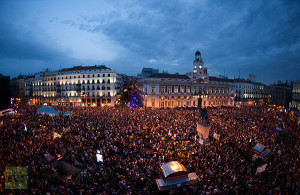Rick Esbenshade
May 9 is officially proclaimed as “Europe Day” by the European Union (EU)—an official, symbolic holiday ignored by most Europeans. This year, any celebration was overshadowed by the May 6 election results in France and Greece, in which citizens
resoundingly rejected the austerity orthodoxy of EU institutions. Instead of a unified front, Europe is facing dissension and uncertainty as more and more question the benefits of EU membership and the Euro currency zone faces the possibility of breakup. Has the economic crisis, which even mainstream economists and press are calling a “double-dip” recession, produced a new paradigm? Will citizens and their national governments take back power from the faceless ‘Eurocrats,’ whose decrees from Brussels have impoverished Europeans from Valencia to Vilnius, producing official unemployment rates of 10-25% (effectively even higher)? Furthermore, what relevance does this turmoil have for us in the US?
As one might expect for an agglomeration of 27 countries and even more languages, ethnicities, histories and world views, prospects for a clear path forward are muddied by conflicts. The aforementioned elections highlighted the rise of what the mainstream media labels “populist” or “extremist” forces; perhaps the most visible of these polarities lie between the Left and Right, West and East, and immigrant and ‘native’ divisions.
(Caption: The Greek crisis and Merkel and the IMF “to the rescue”)
In Greece, two establishment parties—the New Democracy (ND) and the Socialist Party (PASOK)—have traded off power for the last several decades. But votes for these two parties together failed to match the total for four upstart parties who all oppose the crippling debt payments and austerity program forced by Germany and the European Central Bank: the leftist Syriza coalition; the Communist Party (KKE); the Golden Dawn (Chrysi Avgi), an extreme nationalist party usually labeled ‘neo-fascist’; and the Democratic Left (DIMAR), a Syriza split-off. This result has made it highly unlikely that a new majority government can be formed, forcing new elections on June 17. The possibility of a Greek default on its debt and consequent exit from the Euro zone, is roiling financial markets and EU institutions.
(Caption: Facing down riot police during Greek general strike)
In the recent French Presidential elections, the runoff system practically ensured that one of the two major candidates, incumbent Nicolas Sarkozy of the center-right Union for a
Popular Movement, and the Socialist Party’s challenger Francois Hollande, would win. Nevertheless, the first-round showing of the National Front of Marine Le Pen (18%)—a nationalist party long prominent for its anti-immigrant stance and recently for concentrating its ire on the EU establishment, shook up the political landscape. In addition, the strongly anti-austerity Left Front of Jean-Luc Melanchon (11%), which opposes the EU fiscal treaty, probably pushed President-elect Hollande to espouse a stiffer anti-austerity stance. But according to longtime correspondent Diana Johnstone on the Counterpunch website, “There is no more [a] real President of France”—the international bond markets and the straitjacket of EU rules and agreements will allow him, at best, token moves towards growth and job creation.
The deep and longstanding European cultural divide between Left and Right—and, politically, the issue of immigration policy—seems to preclude any short-term prospects of an alliance between, say, the French Left and National Fronts to overthrow the establishment and make a radical change. However, the financial crisis and the losses of
establishment parties across the continent in favor of radical critics and their political vehicles also seems unlikely to allow for ‘business as usual.’ Just two weeks before these election results, the Dutch government fell when Geert Wilders of the anti-Euro, anti-austerity and anti-immigrant Freedom Party pulled out of talks on an austerity
budget. New elections will be held in September. London Newspaper The Guardian lists ten Euro zone governments that have failed in the last year. In addition to the Greek and Dutch, these include Ireland, Finland, Portugal, Slovenia, Slovakia, Italy, Spain, and Romania.
Beyond the restrictive possibilities of electoral politics, mass popular movements and mobilizations have begun to shift from protests to alternative visions. In Prague on April 21, citizens came together to assail a governing coalition discredited by austerity measures and simultaneous corruption scandals with banners that read “Stop
Thieves!” This demonstration was the largest seen in the Czech Republic since the ‘Velvet Revolution’ that overthrew the hard-line Communist regime in 1989. In Spain, where official unemployment is the highest in the Euro zone at 25%, and youth unemployment over twice that, the movement of the “indignados” (Indignant Ones) has been building for the past year. They brought over 100,000 to the streets of major cities in mid-May. Increasing repression of the movement by the state, including serious injuries when police fired rubber bullets at demonstrators supporting a March 29 general strike in Barcelona, and the sense of the fragility of Spanish democracy (the 40-year Franco dictatorship only ended in 1975) have spawned a conviction that citizens’ rights cannot be taken for granted but must be fought for. The group “Derecho de Rebelión” (Right to Rebellion) has produced a “manual of economic disobedience,” calling for local control of financial affairs, ‘time banks’ and cooperatives, and “tax resistance, self-organization of debtors and bankruptcy as a form of action” (see www.derechoderebelion.net/version-imprimir/english-version/).
(Caption: Indignados during a general strike)
In Eastern Europe, philosophies of the Left are still shadowed by four decades of Communist authoritarian rule that ended in 1989. Parties nominally ‘on the left’ have been the most enthusiastic backers of the ‘Europeanization project,’ with its massive privatization, impoverishment, and opening up of national economies to domination by
West European multinationals and banks. In this context, so-called ‘hard Right’ parties, like the Jobbik in Hungary, have been the only avenue for anti-EU expression (see “‘Hungarian Tea Party’ or ‘Occupy Brussels’”? in the Public I, December 2011). In large part, these formations are characterized by extreme nationalism and anti-immigrant, anti-Roma (Gypsy), anti-Semitic and anti-gay sentiment, as well as evocations of pre-World War II fascist parties. But the West European Right has been honing its anti-EU rhetoric, heralding a possible closing of this East-West gap. As Johnstone points out, Le Pen, while at the head of a party her father made famous for its anti-Muslim immigrant slurs, advocates immediate withdrawal from Afghanistan and the establishment of a Palestinian state. Her ‘victory’ statement after the first election round that “All of us, together, have blown apart the monopoly of the two parties of the banks, of finance, of multinationals, of giving up, of abandonment” would not seem out of place at an Occupy rally.
(Caption: “Generation nothing: no work, health, education or rights”—Spain)
So where does this leave Europe, Europeans and those of us watching from the United States hoping for an anti-austerity, pro-popular turn? Prospects seem exciting but unpredictable, to say the least. The contradictions of the Ron Paul campaign, with its focus on anti-intervention abroad and ties to racist groups at home, somewhat echo the confusion of the European left-right scale. However, as Guardian commentator Ian Traynor pointed out, populists “From Hungary to Sweden, Finland to Greece” are all “to the left of European social democracy in supporting generous welfare states, early retirement ages, pensions—a strong state munificent in its public spending.” This combination between xenophobia and support for ‘big government’ seems jarring to American ears. Johnstone has coined the striking slogan “Anti-fascism kills democracy” to express how any opposition to the rule of banks and finance capital is christened “populism” and dismissed as a “step towards fascism.” Perhaps our categories, as well as our politics, need to be expanded.




